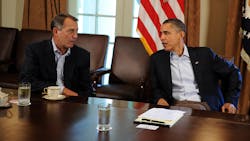Election analysis: Will partisan gridlock loosen?
In his victory speech early this morning, President Barack Obama remarked that he was “looking forward to reaching out and working with leaders of both parties to meet the challenges we can only solve together” and listed just a few such issues: “Reducing our deficit. Reforming our tax code. Fixing our immigration system. Freeing ourselves from foreign oil. “
Stating only those domestic priorities was likely calculated by the President to communicate some sort of agenda for his second term to the country.
But perhaps that short list also publicly telegraphed to Republican leaders in the House and Senate that the White House intended to engage them on these key issues, which continue to impact the state of the U.S. economy and national security.
While the President said he would reach across the political aisle to seek to get things done in his second term, he will nonetheless return to work facing a still deeply polarized Congress: In fact, the election results painted the House redder and the Senate bluer.
“The continuation of the status quo – Democratic president, Democratic Senate, Republican House – foretells more gridlock,” pointed out a piece posted by The Christian Science Monitor. “And by not offering a detailed prescription for addressing the nation’s unsustainable deficits, particularly on entitlement programs, Obama enters a second term without a clear mandate for action.”
Whether or not the President received a “clear mandate,” by the time the election was called by major news organizations, he had already run up an impressive tally of 303 electoral votes (which may rise to 332 if he wins Florida, where vote-tallying continues.) He also won the popular vote, albeit by a much slimmer margin.
The President won eight of the nine so-called battleground states not along geographical but demographic lines. So did some U.S. Senators and Representatives and some Governors.
Perhaps with those demographic factors in mind— and with an eye on the next midterm Congressional elections—House Speaker John Boehner (R-OH) issued his own plea for bipartisanship last night.
A news report posted by The Washington Post observed that … “after Obama’s re-election was clear, Boehner — re-elected without opposition — said voters had conveyed a desire for compromise. That was a departure from the House GOP’s general tone over the past two years, during which the conservative GOP House majority has had numerous bitter clashes with Obama over deficit reduction, taxes and spending.
“If there is a mandate, it is a mandate for both parties to find common ground and take steps together to help our economy grow and create jobs, which is critical to solving our debt,” Boehner said in a written statement.
But the newspaper rightly pointed out that “the prospects of continued gridlock over major issues remained strong, both because of the GOP’s strong conservative bent and because Boehner has sometimes faced challenges shepherding his rank-and-file members to endorse deals he’s wanted to strike.”
The most pressing domestic issue for the President and Congress is to prevent the U.S. economy from being driven over the “fiscal cliff” if Dec. 31st arrives without a compromise deal to prevent that catastrophe. Indicating the Speaker was ready to tackle this, his office issued this statement: “House Speaker John Boehner will deliver a statement today, Wednesday, November 7, at 3:30 p.m. ET on the fiscal cliff and the need for both parties to find common ground and take steps together to help our economy grow and create jobs, which is critical to solving our debt.”
“Fiscal cliff” is shorthand for the intensely negative impact that a package of federal tax hikes and spending cuts set to automatically take place this Dec. 31st will have on the economy--- if no action is taken in time to modify the enabling legislation.
Bob Costello, chief economist & vp of the American Trucking Associations (ATA) has called the fiscal cliff a severe “policy-driven” risk to the economy. By that he means it is up to Congress and the White House to prevent the economy from falling over it.
Looking beyond the immediate concern of blocking off the fiscal cliff to protect taxpayers and influence business owners to make greater investments (that will ultimately boost both job creation and truck freight), the election results over the longer term will impact truck fleet owners in various ways.
There can be little doubt that regulatory action by the Executive Branch will continue apace in Obama’s second term.
Any prospect for Congress overturning or even modifying the “Obamacare” healthcare-reform measures is dead on arrival with Obama back in office and the Senate more firmly in Democratic hands.
Less certain at this point is what will happen with transportation spending—specifically how that spending will break toward public transportation (including high-speed rail), which is an agenda item for the President, vs. for highway/bridge infrastructure.
As pointed out in Politico.com’s Morning Transportation blog today, what exact impact the President’s reelection will have on transportation spending is “not entirely clear, as there are a host of unanswered questions about infrastructure that Obama will have to work on with House Republicans to reach any sort of consensus ahead of the next transportation bill's due date in just under two years.”
The post’s writers also observed that they are “watching to see what happens with Transportation Secretary Ray LaHood, the subject of endless Washington parlor games, but Obama’s budget will be telling in a different way. Will it include something the GOP can work with or will we see repackaged proposals that were non-starters in the House?”
Whether or not or for how long Secry. Hood stays around, the next budget released by the White House will indeed provide the tea leaves needed to see just how bipartisan the approach will be from that end of Pennsylvania Avenue.
